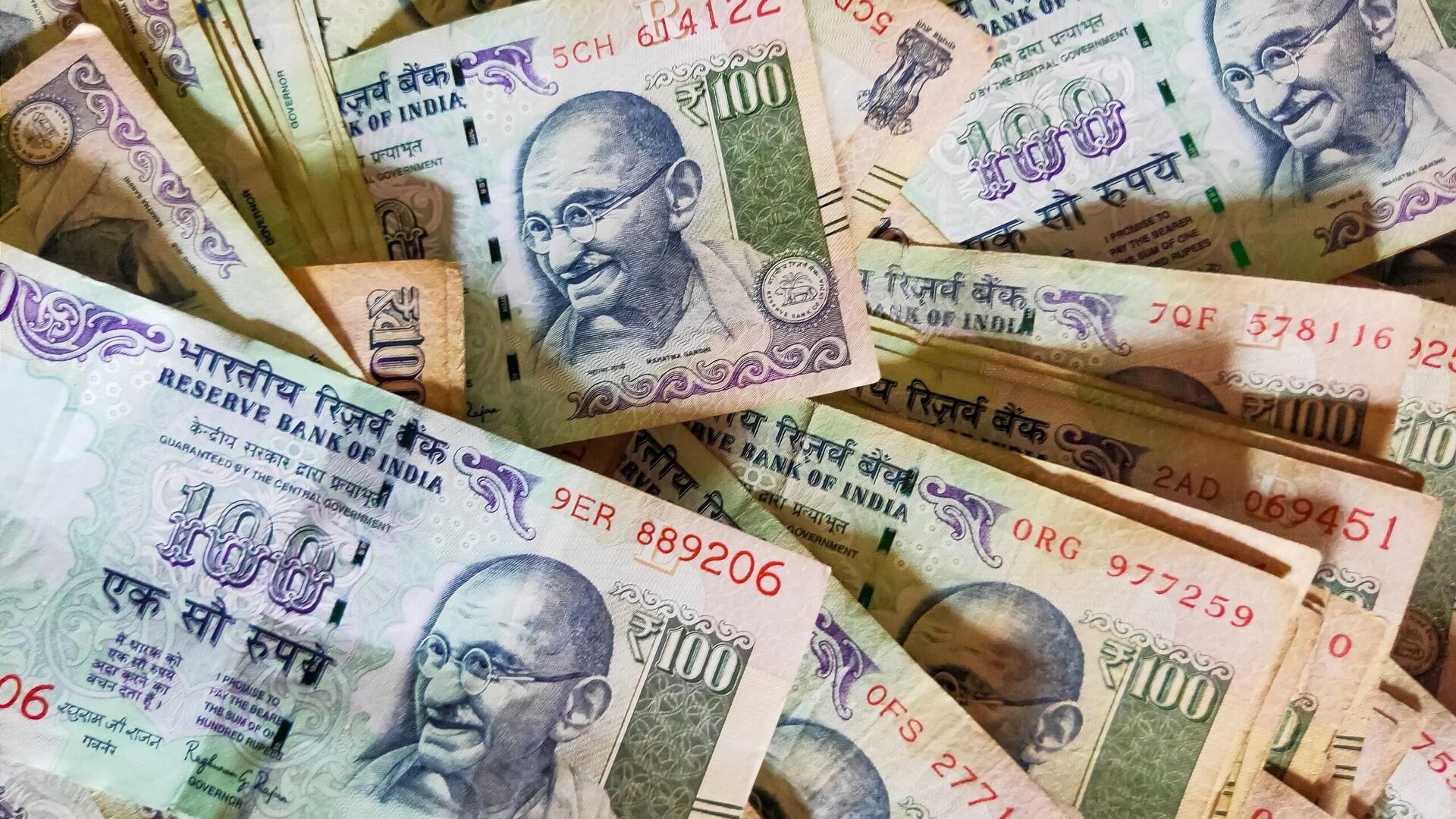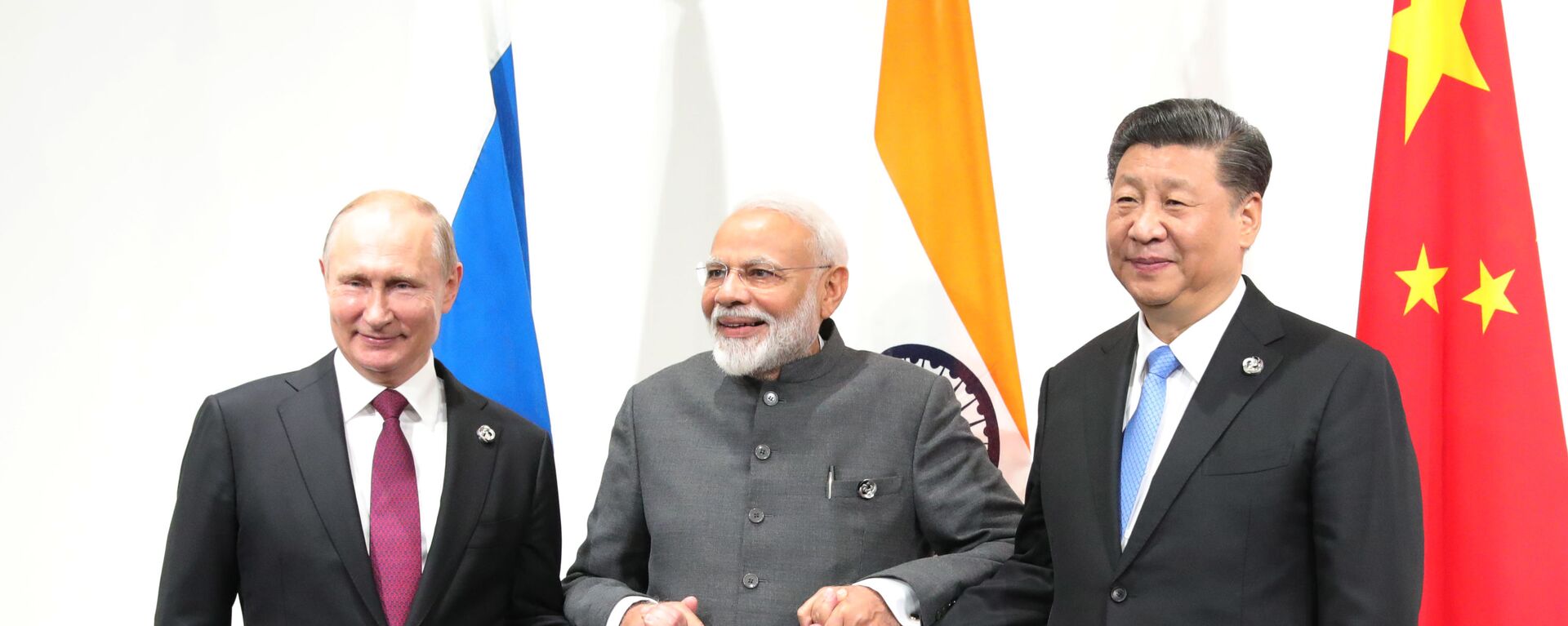https://sputniknews.in/20250114/how-rupees-slide-on-foreign-exchange-could-impact-indias-economy-8654505.html
How Rupee's Slide on Foreign Exchange Could Impact India's Economy
How Rupee's Slide on Foreign Exchange Could Impact India's Economy
Sputnik India
The Indian National Rupee (INR) declined to an all-time low of 86.6 against the US dollar on Monday, signaling potential impacts on growth in the world’s... 14.01.2025, Sputnik India
2025-01-14T17:11+0530
2025-01-14T17:11+0530
2025-01-14T19:49+0530
sputnik opinion
joe biden
russia
india
us
reserve bank of india (rbi)
rising economies
western sanctions
sanctions
trade in national currencies
https://cdn1.img.sputniknews.in/img/07e7/01/0b/469217_0:241:2560:1681_1920x0_80_0_0_9806b83454c474ee1250f812870f5f63.jpg
The depreciation of the Indian National Rupee (INR), coupled with a new set of United States sanctions targeting Russia's energy sector, could result in increased inflation in India, experts told Sputnik India.Notably, India fulfills more than a quarter of its oil needs from Russia.This is a new set of sanctions, affecting the fleet of ships that transport crude between countries, she said. What's bizarre about this step is that the Joe Biden administration has even sanctioned American companies that assisted Russia in extracting oil or in other ways, the academic elaborated.While the average cost of a barrel of crude is approximately $80, India has benefited from its long-standing partnership with Russia, as European nations reduce oil imports from the country, the expert explained.What America is trying to do is push its oil exports, aiming to reduce India's dependence on supplies from Russia, she underlined.While imports will become more expensive due to the rupee's depreciation against the dollar, export gains will improve, Nisha Taneja, a professor at the Indian Council for Research on International Economic Relations (ICRIER), asserted in a conversation with Sputnik India.Clearly, the impact on India's exports, which rely significantly on imports, may not be as severe, as the losses from imported items could be mitigated by gains in exports, she suggested.Refined petroleum and gems and jewelry – two key export items – together account for 23% of India's exports and are import-intensive, with their raw materials making up nearly 44% of the country's total imports, Taneja stated.Nonetheless, India has options to mitigate the situation, expanding and diversifying exports, along with efforts to attract more foreign direct investment (FDI), Taneja asserted.The recent outflow of foreign institutional investment (FII), which tends to be volatile, is one the reasons for the rupee's depreciation, she emphasised.INR's decline is caused by geopolitical risks and uncertainties, Lekha Chakraborty, a professor and faculty member at National Institute of Public Finance and Policy, suggested during an interview with Sputnik India.The impact of Trump 2.0 is yet another, as the dollar is becoming stronger, she highlighted. Additionally, the volatility in the energy prices will contribute to inflation as the rupee's decline might increase the import bill, she analysed.
https://sputniknews.in/20250109/battle-of-economic-models-moscow-against-washington-and-beijing--8638262.html
russia
india
us
Sputnik India
feedback.hindi@sputniknews.com
+74956456601
MIA „Rossiya Segodnya“
2025
Pawan Atri
https://cdn1.img.sputniknews.in/img/07e6/0c/13/139630_147:0:831:684_100x100_80_0_0_8fa2b25903e7787fe6a2698552c167df.png
Pawan Atri
https://cdn1.img.sputniknews.in/img/07e6/0c/13/139630_147:0:831:684_100x100_80_0_0_8fa2b25903e7787fe6a2698552c167df.png
News
en_IN
Sputnik India
feedback.hindi@sputniknews.com
+74956456601
MIA „Rossiya Segodnya“
Sputnik India
feedback.hindi@sputniknews.com
+74956456601
MIA „Rossiya Segodnya“
Pawan Atri
https://cdn1.img.sputniknews.in/img/07e6/0c/13/139630_147:0:831:684_100x100_80_0_0_8fa2b25903e7787fe6a2698552c167df.png
joe biden, russia, india, us, reserve bank of india (rbi), rising economies, western sanctions, sanctions, trade in national currencies, donald trump, global oil production, oil exporters, oil supplies, russian oil
joe biden, russia, india, us, reserve bank of india (rbi), rising economies, western sanctions, sanctions, trade in national currencies, donald trump, global oil production, oil exporters, oil supplies, russian oil
How Rupee's Slide on Foreign Exchange Could Impact India's Economy
17:11 14.01.2025 (Updated: 19:49 14.01.2025) The Indian National Rupee (INR) declined to an all-time low of 86.6 against the US dollar on Monday, signaling potential impacts on growth in the world’s fastest-growing major economy.
The depreciation of the Indian National Rupee (INR), coupled with a new set of United States sanctions targeting Russia's energy sector, could result in increased inflation in India, experts told Sputnik India.
Notably, India fulfills more than a quarter of its oil needs from Russia.
It is a double whammy for India because the value of the rupee is declining and on the other hand, the US has put extreme sanctions on Russia for exporting crude, primarily targeted at India and China, Anuradha Chenoy, an adjunct professor at the Jindal School of International Affairs at the O.P. Jindal Global University, told Sputnik India.
This is a new set of sanctions, affecting the fleet of ships that transport crude between countries, she said. What's bizarre about this step is that the Joe Biden administration has even sanctioned American companies that assisted Russia in extracting oil or in other ways, the academic elaborated.
"Given that India gets 36% of its oil from Russia, and pays the nation's crude suppliers in INR, it is kind of arm-twisting India into sourcing its oil requirements, some amount at least, from other sovereign states in the Middle East or the US, where New Delhi would have to pay in USD, resulting in increased inflation in India," Chenoy stated.
While the average cost of a barrel of crude is approximately $80, India has benefited from its long-standing partnership with Russia, as European nations reduce oil imports from the country, the expert explained.
What America is trying to do is push its oil exports, aiming to reduce India's
dependence on supplies from Russia, she underlined.
"As usual, Biden has tried to create problems for India, which he shouldn't have done, especially 10 days before leaving office," Chenoy stressed.
While imports will become more expensive due to the rupee's depreciation against the dollar, export gains will improve, Nisha Taneja, a professor at the Indian Council for Research on International Economic Relations (ICRIER), asserted in a conversation with Sputnik India.
Clearly, the impact on India's exports, which rely significantly on imports, may not be as severe, as the losses from imported items could be mitigated by gains in exports, she suggested.
Refined petroleum and gems and jewelry – two key export items – together account for 23% of India's exports and are import-intensive, with their raw materials making up nearly 44% of the country's total imports, Taneja stated.
"With the dollar's appreciation, the price of domestically produced goods will be impacted. If we look at our import basket, 88% of imports are constituted by raw materials, capital goods, and intermediates — essential for the manufacturing industry. Crude oil, also imported for domestic use, will add to the overall cost of production, leading to an increase in inflation," the economist said.
Nonetheless, India has options to mitigate the situation, expanding and diversifying exports, along with efforts to attract more foreign direct investment (FDI), Taneja asserted.
The recent outflow of foreign institutional investment (FII), which tends to be volatile, is one the reasons for the rupee's depreciation, she emphasised.
"On the other hand, FDI is more integrated into the real economy and can help drive up exports. Another step India could take is to trade in local currency with some of its major trading partners, as this will reduce our dependence on the dollar. India's Rupee-Rouble trade is a good example," Taneja pointed out.
INR's decline is caused by geopolitical risks and uncertainties,
Lekha Chakraborty, a professor and faculty member at National Institute of Public Finance and Policy, suggested during an interview with
Sputnik India.
The impact of Trump 2.0 is yet another, as the dollar is becoming stronger, she highlighted. Additionally, the volatility in the energy prices will contribute to
inflation as the rupee's decline might increase the import bill, she analysed.
"India's CAD (Current Account Deficit) is under control. But capital will become flighty if there are interest rate differentials and Western central banks adopt a hawkish stance. Despite that, beyond a point, the Reserve Bank of India (RBI) should avoid intervening in currency markets, as it will deplete Forex reserves, and allow the ad hoc configuration of demand and supply to set the currency," Chakraborty concluded.



